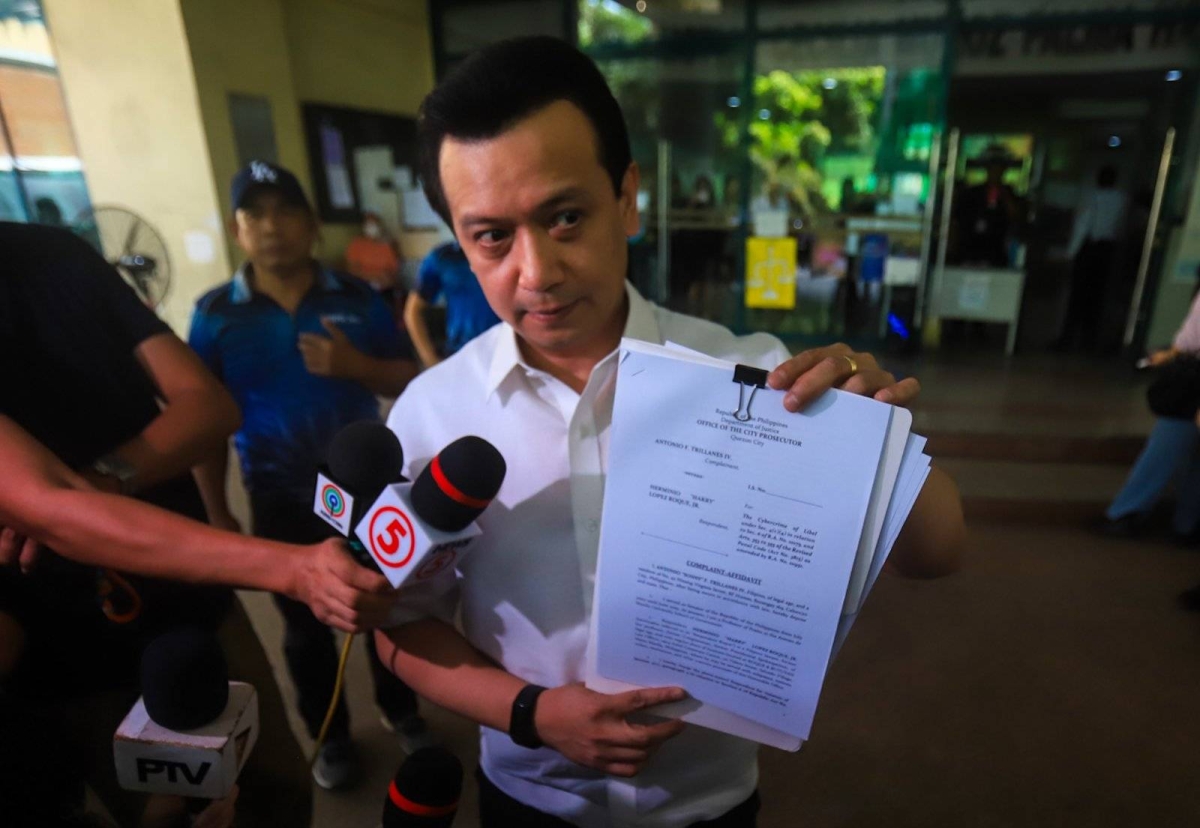Former Senator Antonio Trillanes 4th Files Cyberlibel Complaint
Former Senator Antonio Trillanes 4th made headlines on Tuesday as he filed a complaint for cyberlibel against officials of ex-President Rodrigo Duterte, along with his spokesman. This move comes in response to persistent online attacks and the dissemination of false accusations by the respondents against him.
In the complaint, Trillanes included Sonshine Media Network International (SMNI) and vlogger Byron Cristobal, also known as Banat By. This legal action stems from accusations made by Duterte spokesman Harry Roque and Banat By, alleging that Trillanes sold and gave away the Scarborough Shoal to China during his backchannel talks in 2012.
Trillanes, in an interview with The Manila Times, emphasized that despite his repeated explanations and official statements from incumbent government officials during senate hearings, the fake news about losing Scarborough continues to be perpetuated by pro-Duterte personalities. He views this as an attempt to deflect blame from the Duterte administration.
Libel and Cyber Libel Charges
Additionally, the former senator filed libel and cyber libel charges against Guillermina Barrido and SMNI hosts and executives for publishing an interview in which Barrido repeatedly alleged that Trillanes tried to convince her and purportedly paid her to be a fake witness against then President Duterte.
It’s worth noting that Barrido had previously filed a kidnapping case against Trillanes during the Duterte administration, which was eventually dismissed by the Department of Justice. Abigail Valerio, a staff member of Trillanes, also announced her intention to file criminal complaints before the National Bureau of Investigation against several social media account owners for spreading disinformation and libelous statements about him.
Trillanes expressed that the filing of these cases serves as a pushback against the culture of disinformation that was propagated and encouraged during the Duterte administration.
Trillanes’ Push Back Against Disinformation
Alongside the cyberlibel complaint, Trillanes also filed libel and cyberlibel charges against a certain Guillermina Barrido and SMNI hosts and executives. This was in response to an interview published by SMNI, where Barrido repeatedly alleged that Trillanes tried to convince her and purportedly paid her to be a fake witness against then-President Duterte.
It’s worth noting that Barrido had previously filed a kidnapping case against Trillanes during the Duterte administration, which was eventually dismissed by the Department of Justice. Trillanes’ staff member, Abigail Valerio, informed The Manila Times that she will also file criminal complaints with the National Bureau of Investigation against several social media account owners for spreading disinformation and libelous statements about the former senator.
Trillanes emphasized that the filing of these cases is a pushback against the culture of disinformation that was propagated and encouraged during the Duterte administration. He believes that this legal action is necessary to hold those responsible for the spread of false information accountable.
Trillanes’ Political Landscape: From the Senate to the Courts
Antonio Trillanes IV has been a prominent figure in Philippine politics, known for his outspoken criticism of former President Duterte’s policies and his efforts to expose alleged corruption within the administration. As a former senator, Trillanes has been a vocal advocate for good governance and accountability.
During his time in the Senate, Trillanes gained national attention for his investigations into various controversies, including the alleged hidden wealth of the Duterte family. His relentless pursuit of these issues often put him at odds with the administration, leading to a tense political climate.
Now, as Trillanes turns to the courts to address the online attacks and false accusations against him, it becomes clear that the battle for truth and transparency has shifted from the Senate chambers to the legal arena. This move highlights the former senator’s determination to confront the spread of disinformation and hold those responsible accountable.
Navigating the Legal Landscape: Cyberlibel and Defamation in the Philippines
The Philippines has seen a growing trend of cyberlibel and defamation cases in recent years, as the digital landscape has become a battleground for political and social discourse. The country’s Cybercrime Prevention Act of 2012 criminalizes the act of libel committed through computer systems or any other similar means.
Under the law, individuals found guilty of cyberlibel can face imprisonment of up to 12 years and a fine of up to 1 million Philippine pesos. The law has been criticized by human rights groups and media organizations for its potential to stifle free speech and expression, as it can be used to target critics and dissidents.
Trillanes’ decision to pursue legal action against his accusers reflects the complex legal landscape that public figures in the Philippines must navigate. By leveraging the Cybercrime Prevention Act, Trillanes aims to hold those responsible for the spread of false information accountable and to protect his reputation and political legacy.
Contextualizing the Dispute: Scarborough Shoal and the Philippines-China Relationship
The dispute over the Scarborough Shoal, a small group of islands in the South China Sea, has been a contentious issue in the Philippines-China relationship. In 2012, during the presidency of Benigno Aquino III, a standoff occurred between the Philippine and Chinese navies over the control of the shoal, which is claimed by both countries.
Trillanes, who was involved in backchannel talks with the Chinese government at the time, has consistently maintained that the Philippines did not lose the Scarborough Shoal during his negotiations. However, the Duterte administration and its supporters have repeatedly accused Trillanes of “selling” or “giving away” the shoal to China.
This ongoing dispute over the Scarborough Shoal, and the allegations surrounding Trillanes’ role in it, have become a political battleground. The former senator’s cyberlibel complaint is an attempt to clear his name and challenge the narrative that he was responsible for the loss of the shoal to China.
Implications for Philippine Politics and Media
Trillanes’ legal action against his accusers has broader implications for the state of Philippine politics and the media landscape. The former senator’s push to hold those responsible for spreading disinformation accountable underscores the growing concern over the influence of online platforms and social media in shaping public discourse.
The proliferation of fake news and the use of social media to attack political opponents have become major issues in the Philippines, with many observers arguing that these practices have eroded public trust and undermined democratic institutions. Trillanes’ case serves as a high-profile example of how public figures are attempting to fight back against these trends.
Additionally, the involvement of media organizations, such as SMNI, in the dissemination of potentially libelous information raises questions about the role of the media in the country’s political landscape. The case may also prompt discussions about the need for stronger regulations and accountability measures to ensure the integrity of journalistic practices and the protection of individual rights.
Navigating the Global Landscape: Trillanes’ Pursuit of Justice
As Trillanes navigates the legal system in the Philippines, it’s important to consider the broader global context in which this dispute is unfolding. The former senator’s pursuit of justice against his accusers extends beyond the borders of his home country, as he seeks to address the international implications of the allegations made against him.
The dispute over the Scarborough Shoal, for instance, has significant geopolitical ramifications, as it involves the competing territorial claims of the Philippines and China in the South China Sea. Trillanes’ role in the backchannel talks during the Aquino administration has been scrutinized and criticized, and the former senator’s efforts to clear his name could have ripple effects on the Philippines’ diplomatic relations with its neighbors.
Moreover, the spread of disinformation and the use of social media to attack public figures are not exclusive to the Philippines. These phenomena are global in nature, and Trillanes’ case may provide valuable insights into how individuals and institutions can navigate the complex landscape of online discourse and legal challenges.
Conclusion: Trillanes’ Pursuit of Truth and Accountability
In the face of persistent online attacks and the dissemination of false accusations, former Senator Antonio Trillanes 4th has taken a resolute stand. His decision to file cyberlibel, libel, and criminal complaints against his accusers represents a broader push to hold those responsible for the spread of disinformation accountable.
Trillanes’ legal actions reflect his unwavering commitment to truth, transparency, and the protection of his political legacy. As he navigates the complex legal landscape of the Philippines, his case has implications that extend beyond the borders of his home country, touching on issues of global significance, such as geopolitical tensions, media integrity, and the challenges of navigating the digital realm.
Ultimately, Trillanes’ pursuit of justice serves as a reminder of the importance of upholding democratic values, safeguarding individual rights, and fostering a political climate that prioritizes factual discourse and accountability. As the legal proceedings unfold, the outcome of this case will undoubtedly have far-reaching consequences for Philippine politics and the broader struggle against the spread of disinformation.
Source: The Manila Times







